2013年上外高翻会议口译试题
上外高翻英语口译真题
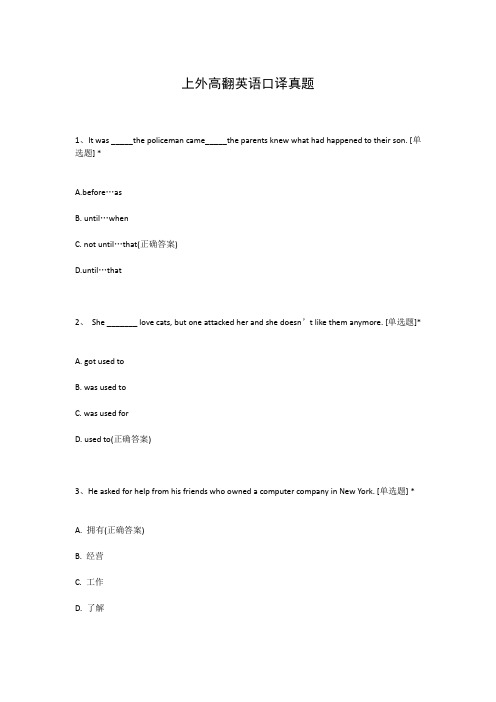
上外高翻英语口译真题1、It was _____the policeman came_____the parents knew what had happened to their son. [单选题] *A.before…asB. until…whenC. not until…that(正确答案)D.until…that2、She _______ love cats, but one attacked her and she doesn’t like them anymore. [单选题]*A. got used toB. was used toC. was used forD. used to(正确答案)3、He asked for help from his friends who owned a computer company in New York. [单选题] *A. 拥有(正确答案)B. 经营C. 工作D. 了解4、There _______ some milk in the glass. [单选题] *A. is(正确答案)B. areC. haveD. has5、—______ you speak French?—Yes, I can.()[单选题] *A. NeedB. Can(正确答案)C. MightD. Must6、There ______ a football match and a concert this weekend.()[单选题] *A. isB. haveC. will be(正确答案)D. will have7、14.He is cutting the apple ________ a knife. [单选题] *A.inB.toC.with(正确答案)D.by8、It’s one of _______ means of transportation. [单选题] *A. cheapB. convenientC. second-handD. the most convenient(正确答案)9、Growing vegetables()constantly watering. [单选题] *A. neededB. are neededC. were neededD. needs(正确答案)10、12.Who will ________ the Palace Museum after Shan Jixiang retires? [单选题] * A.in chargeB.in charge ofC.be in charge of (正确答案)D.be in the charge of11、Either you or the president()the prizes to these gifted winners at the meeting. [单选题] *A. is handing outB. are to hand outC. are handing outD. is to hand out(正确答案)12、Have you kept in()with any of your friends from college? [单选题] *A. contractB. contact(正确答案)C. continentD. touching13、( ) ____ eye exercises ___ good __ your eyes. [单选题] *A. Doing, is, for(正确答案)B. Doing, are, forC. Do, is, forD. Do, are, at14、We have made a _______ tour plan to Sydney. [单选题] *A. two dayB. two daysC. two-day(正确答案)D. two-days15、35.___________ good music the teacher is playing! [单选题] *A.What(正确答案)B.HowC.What aD.What the16、Becky is having a great time ______ her aunt in Shanghai. ()[单选题] *A. to visitB. visitedC. visitsD. visiting(正确答案)17、He’s so careless that he always _______ his school things at home. [单选题] *A. forgetsB. leaves(正确答案)C. putsD. buys18、I don’t like snakes, so I ______ read anything about snakes.()[单选题] *A. alwaysB. usuallyC. oftenD. never(正确答案)19、You can borrow my book, _____ you promise to give it back to me by the end of this month. [单选题] *A.even ifB. as long as(正确答案)C. in caseD. even though20、The book is very _______. I’ve read it twice. [单选题] *A. interestB. interestedC. interesting(正确答案)D. interests21、My friends will _______ me at the airport when I arrive in London. [单选题] *A. takeB. meet(正确答案)C. receiveD. have22、The commander said that two _____ would be sent to the Iraqi front line the next day. [单选题] *A. women's doctorB. women doctorsC. women's doctorsD. women doctor(正确答案)23、E-mail is _______ than express mail, so I usually email my friends. [单选题] *A. fastB. faster(正确答案)C. the fastestD. more faster24、She’s _______ with her present _______ job. [单选题] *A. boring; boringB. bored; boredC. boring; boredD. bored; boring(正确答案)25、( ). The old man enjoys ______ stamps. And now he has1300 of them [单选题] *A. collectB. collectedC. collecting(正确答案)D. to collect26、My mother and my aunt are both _______. They work in a big supermarket. [单选题] *A. actressesB. doctorsC. salesmenD. saleswomen(正确答案)27、Yesterday I _______ a book.It was very interesting. [单选题] *A. lookedB. read(正确答案)C. watchedD. saw28、He was born in Canada, but he has made China his _______. [单选题] *A. familyB. addressC. houseD. home(正确答案)29、A small village cuts across the river. [单选题] *A. 切B. 穿过(正确答案)C. 划船D. 踢30、_____from far away, the 600-meter tower is stretching into the sky. [单选题] *A. SeeB. SeeingC. To seeD. Seen(正确答案)。
2013.4孙犁口译指定范围
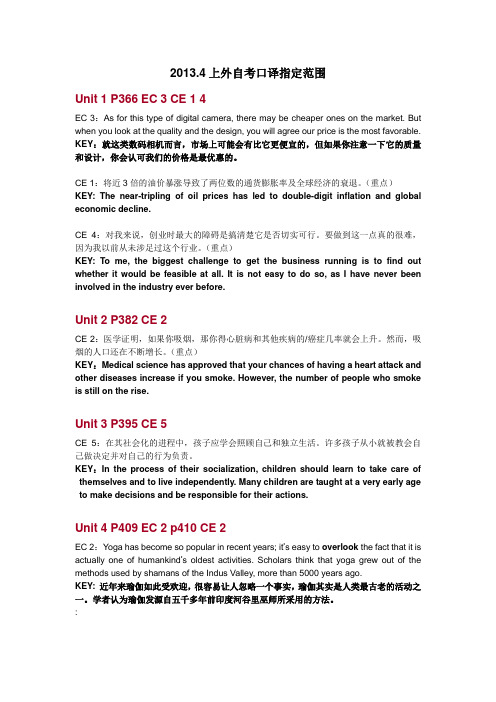
2013.4上外自考口译指定范围Unit 1 P366 EC 3 CE 1 4EC 3:As for this type of digital camera, there may be cheaper ones on the market. But when you look at the quality and the design, you will agree our price is the most favorable. KEY:就这类数码相机而言,市场上可能会有比它更便宜的,但如果你注意一下它的质量和设计,你会认可我们的价格是最优惠的。
CE 1:将近3倍的油价暴涨导致了两位数的通货膨胀率及全球经济的衰退。
(重点)KEY: The near-tripling of oil prices has led to double-digit inflation and global economic decline.CE 4:对我来说,创业时最大的障碍是搞清楚它是否切实可行。
要做到这一点真的很难,因为我以前从未涉足过这个行业。
(重点)KEY: To me, the biggest challenge to get the business running is to find out whether it would be feasible at all. It is not easy to do so, as I have never been involved in the industry ever before.Unit 2 P382 CE 2CE 2:医学证明,如果你吸烟,那你得心脏病和其他疾病的/癌症几率就会上升。
然而,吸烟的人口还在不断增长。
(重点)KEY:Medical science has approved that your chances of having a heart attack and other diseases increase if you smoke. However, the number of people who smoke is still on the rise.Unit 3 P395 CE 5CE 5:在其社会化的进程中,孩子应学会照顾自己和独立生活。
历年高级口译考题翻译试题及答案

历年高级口译考题翻译部分精解第一套英译中Since Darwin, biologists have been-firmly convinced that nature works without plan or meaning, pursuing no aim by the direct road of design. But today we see that this conviction is a fatal error. Why should evolution, exactly as Darwin knew it and described it, be planless and irrational? Do not aircraft design engineers work, at precisely that point where specific calculations and plans give out, according to the same principle of evolution, when they test the serviceability of a great number of statistically determined forms in the wind tunnel, in order to choose the one that functions best? Can we say that there is no process of natural selection when nuclear physicists, through thousands of computer operations, try to find out which materials, in which combinations and with what structural form, are best suited to the building of an atomic reactor? They also practise no designed adaptation, but work by the principle of selection. But it would never occur to anyone to call their method planless and irrational.【参考译文】达尔文以后的生物学家们一直相信,大自然的运行是没有计划没有意义的,不会按照预先设定的途径实现任何目的。
历年高级口译考题翻译试题及答案

历年高级口译考题翻译部分精解第一套英译中Since Darwin, biologists have been-firmly convinced that nature works without plan or meaning, pursuing no aim by the direct road of design. But today we see that this conviction is a fatal error. Why should evolution, exactly as Darwin knew it and described it, be planless and irrational? Do not aircraft design engineers work, at precisely that point where specific calculations and plans give out, according to the same principle of evolution, when they test the serviceability of a great number of statistically determined forms in the wind tunnel, in order to choose the one that functions best? Can we say that there is no process of natural selection when nuclear physicists, through thousands of computer operations, try to find out which materials, in which combinations and with what structural form, are best suited to the building of an atomic reactor? They also practise no designed adaptation, but work by the principle of selection. But it would never occur to anyone to call their method planless and irrational.【参考译文】达尔文以后的生物学家们一直相信,大自然的运行是没有计划没有意义的,不会按照预先设定的途径实现任何目的。
上海外国语大学英语翻译硕士MTI真题
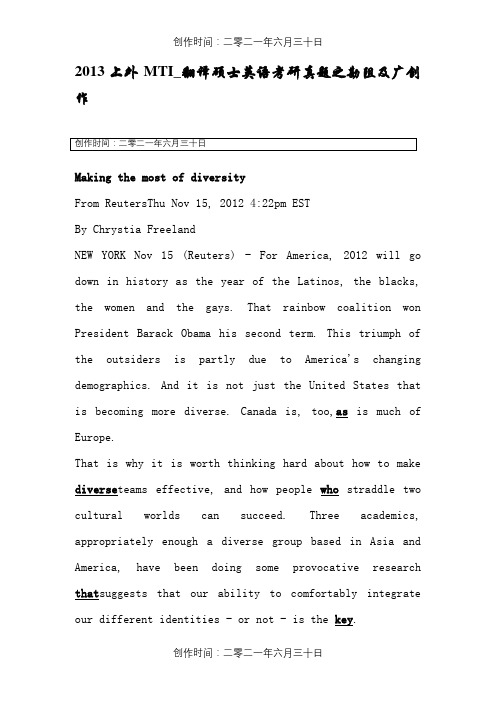
2013上外MTI_翻译硕士英语考研真题之勘阻及广创作Making the most of diversityFrom ReutersThu Nov 15, 2012 4:22pm ESTBy Chrystia FreelandNEW YORK Nov 15 (Reuters) - For America, 2012 will go down in history as the year of the Latinos, the blacks, the women and the gays. That rainbow coalition won President Barack Obama his second term. This triumph of the outsiders is partly due to America's changing demographics. And it is not just the United States that is becoming more diverse. Canada is, too,as is much of Europe.That is why it is worth thinking hard about how to make diverse teams effective, and how people who straddle two cultural worlds can succeed. Three academics, appropriately enough a diverse group based in Asia and America, have been doing some provocative research that suggests that our ability to comfortably integrate our different identities - or not - is the key.In "Connecting the Dots Within: Creative Performance and Identity Integration," Chi-Ying Cheng of Singapore Management University, Jeffrey Sanchez-Burks of the Ross School of Business at the University of Michigan, and Fiona Lee, also at the University of Michigan, argue that ethnic minorities and women in male-dominated professions are most creative when they have found a way to believe that their "multiple and conflicting social identities are compatible.""We tried to see how people who have to deal with seemingly in-conflict culture or gender identities cope," Cheng told me. Their conclusion was that people who have found a way to reconcile their two identities - Asian-Americans, for example, or women who work in male-dominated jobs like engineering - are the best at finding creative solutions to problems."Those who see their identities as compatible, they are better at combining ideas from the two identities to come up with something new," Cheng said. "While those who also share these two social identities, but see them as being in conflict, they cannot come up with new ideas."Cheng, Sanchez-Burks and Lee devised a research strategyto probe this issue that you do not need a Ph.D. to appreciate: They asked Asian-Americans to invent new fusion cuisine dishes using both typically Asian and typically American ingredients, and they asked female engineers to design products geared specifically to women. In both cases, people who were at peace with their dual identities performed better."Asian-Americans who had higher bicultural integration could create more creative recipes, and they believed it was possible to come up with more recipes," Cheng said. "By contrast, Asian-Americans who feel their two identities are in conflict cannot come up with as many creative recipes.''Cheng has her own experience of being a minority. She is from Taiwan but went to graduate school in the United States; she is a woman but has taught in the male-dominated environment of graduate business schools. She does not minimize the challenge of coming to terms with this sort of diversity."People who have high identity integration, it is not that they are more easygoing. It is that they find peace between the two different worlds," Cheng said. "It is notthat easy. Pretending doesn't work. There has to be real understanding and integration between the two worlds. They find a way for the two worlds to coexist inside a person."This academic work is a useful prism for understanding the man who may be the world's most prominent integrator of two potentially conflicting identities: President Obama. He has gained admission to what used to be the most exclusive white club of all, the White House, while remaining patently at ease with his black identity.As Cheng advises, Obama does not ignore the complexities of straddling these two worlds: He governs with an acute awareness of the particular challenges a black skin poses for the man Americans still like to describe as the leader of the free world. But the president is also deeply at ease with his various identities, a psychological state that may help him use them to powerful effect - as in the election campaign, when he rallied pretty much all Americans who think of themselves as different.The conclusions of Cheng, Sanchez-Burks and Lee suggest a tantalizing follow-up question: How can we achieve thepersonal integration these scholars have identified as crucial to making a virtue of diversity? Further research by Cheng offers one answer: "You can integrate your identities if you have positive bicultural experiences. The macrosystem can influence the microsystem."In other words, if the world around us tells us our dual identities are compatible, we will believe that, and act accordingly. If female engineers work in a company that treats their gender as a virtue, they will do better. If Asian-Americans live in a community that celebrates both aspects of their identity, they will be more effective. America's rainbow coalition won at the ballot box this month, but in other settings the nation has become a little weary of diversity-cheering movements like multiculturalism and even explicit feminism. Cheng's work suggests that cynicism may be misplaced. Diversity can work, but we have to work at it.上面划线部份为完型填空的谜底1、According to the author, what it takes for a minorityperson to succeed in the US?2、Why the author considers barak obama a success?3、Elaborate the author’s argument “The macros ystem caninfluence the microsystem.”4、What are the author alluding to with the phrase“rainbow coalition”?Write in English 500 words about your comment on how to succeed in an increasingly diverse environment.。
2013年上海外国语大学考研翻硕MTI翻译基础真题回忆版分享
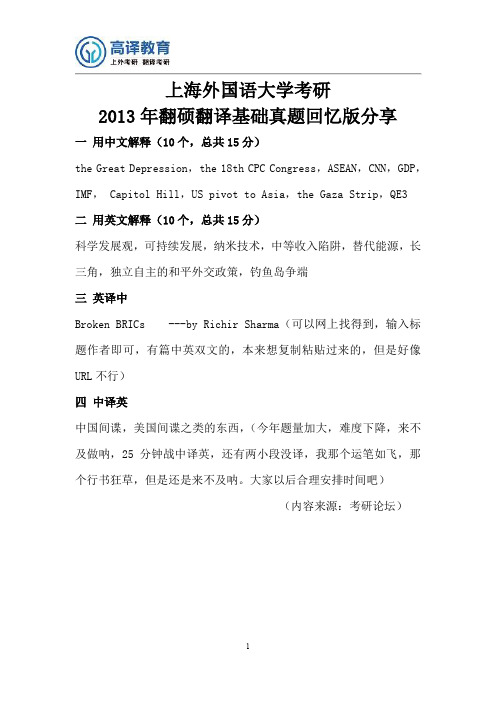
上海外国语大学考研
2013年翻硕翻译基础真题回忆版分享
一用中文解释(10个,总共15分)
the Great Depression,the 18th CPC Congress,ASEAN,CNN,GDP,IMF, Capitol Hill,US pivot to Asia,the Gaza Strip,QE3
二用英文解释(10个,总共15分)
科学发展观,可持续发展,纳米技术,中等收入陷阱,替代能源,长三角,独立自主的和平外交政策,钓鱼岛争端
三英译中
Broken BRICs ---by Richir Sharma(可以网上找得到,输入标题作者即可,有篇中英双文的,本来想复制粘贴过来的,但是好像URL不行)
四中译英
中国间谍,美国间谍之类的东西,(今年题量加大,难度下降,来不及做呐,25分钟战中译英,还有两小段没译,我那个运笔如飞,那个行书狂草,但是还是来不及呐。
大家以后合理安排时间吧)
(内容来源:考研论坛)
1。
高译教育-上海对外经贸大学考研英语翻译基础真题2013
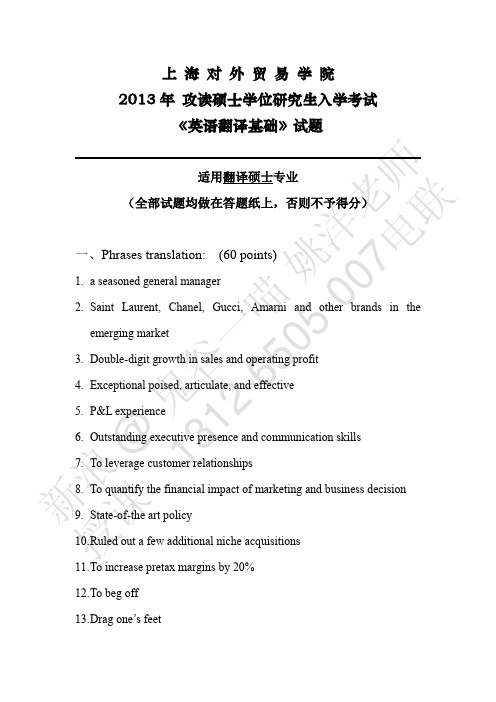
上 海 对 外 贸 易 学 院 2013年 攻读硕士学位研究生入学考试《英语翻译基础》试题适用翻译硕士专业(全部试题均做在答题纸上,否则不予得分)一、Phrases translation: (60 points)1. a seasoned general manager2. Saint Laurent, Chanel, Gucci, Amarni and other brands in the emerging market3. Double-digit growth in sales and operating profit4. Exceptional poised, articulate, and effective5. P&L experience6. Outstanding executive presence and communication skills7. To leverage customer relationships8. To quantify the financial impact of marketing and business decision 9. State-of-the art policy10. R uled out a few additional niche acquisitions11. T o increase pretax margins by 20%12. T o beg off 13. D rag one’s feet新浪 @ 鬼谷一喵 姚洋老师授课丗1312-6505-007电联14. E nough’s enough 15. F iduciary responsibility1. 行业知识丰富2. 极具合作精神,在跨部门项目中表现出色3. 获得极为正面的客户反馈4. 提升品牌质量和现场销售管理质量5. 自有品牌产品6. 负责3亿美元的产品业务7. 负责多个职能部门8. 组织一次全国销售会议9. 远见和个人魅力 10. 在风险重重的十字路口 11. 有创造力,出色的市场意识 12. 设定高绩效的标准13. 有号召力,能领导复杂项目14. 有机增长15. 担任更多的职务,增加业界间知名度二、Paragraphs translation: (90 points)1. Translate the following passage into Chinese :《Give respect and get performance 》新浪 @ 鬼谷一喵 姚洋老师授课丗1312-6505-007电联It sounds clichéd, but to get the best from your people, you have to showrespect for them. This can result in surprising decisions. There was a time when some people regarded workers in England as lazy and careless, but I recognized that England has a very strong appreciation of craftsmanship and tradition, so wepurchased a high-end footwear company, Church’s shoes. People in Italy thought this was crazy.Our first challenge was to decide what to do with the factories. Church’sowned a plant in the middle of Northampton that employed 600 people, and the smart move appeared to be to relocate it out of town, which would give us more space at less cost. But when I visited the factory, I saw that peopl e’s lives were organizedaround its location. Most employees lived nearby and would go home for lunch. If we moved them out of town, we’d be robbing them of an hour at home and forcing them to bring sandwiches to work. Their quality of life would be compromised, and they wouldn’t be getting anything in return. So we kept the factory in town.That decision has paid dividends. We retained nearly all the company’s veryhardworking and talented people, who have rewarded us with increased productivity. And we’ve proved a larger point: English workers are both cheaper and more industrious than Continental workers.You could say that work is about duties. People have a duty to work hardfor me, but I have a duty to respect them as individuals. Another duty I have is to help them learn. That’s a duty I owe to the company as well as to my employees, because a company whose managers take seriously the obligation to help their people improve will be a lot more competitive. Prada is rather good at developing talented employees. Many of our senior managers joined us as young people, and many of the people who have left us have gone on to launch successful businesses of their own.2. Translate the following passage into English :《重用年轻经理》我特别推崇年轻人。
2013年上外高翻会议口译试题
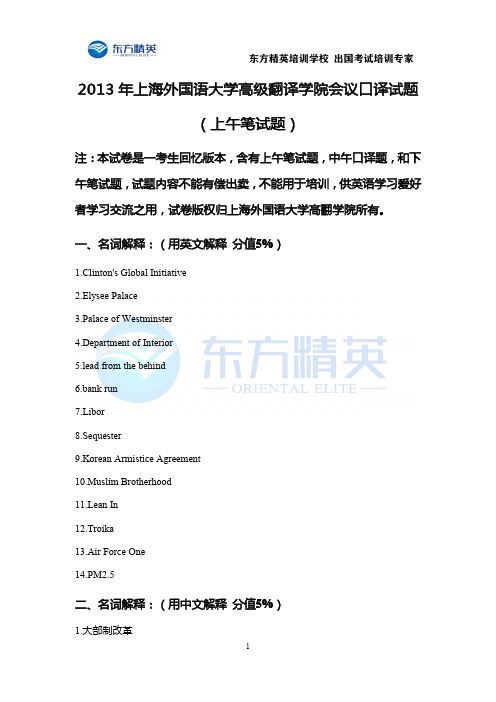
2013年上海外国语大学高级翻译学院会议口译试题(上午笔试题)注:本试卷是一考生回忆版本,含有上午笔试题,中午口译题,和下午笔试题,试题内容不能有偿出卖,不能用于培训,供英语学习爱好者学习交流之用,试卷版权归上海外国语大学高翻学院所有。
一、名词解释:(用英文解释分值5%)1.Clinton's Global Initiative2.Elysee Palace3.Palace of Westminster4.Department of Interior5.lead from the behind6.bank run7.Libor8.Sequester9.Korean Armistice Agreement10.Muslim Brotherhood11.Lean In12.Troika13.Air Force One14.PM2.5二、名词解释:(用中文解释分值5%)1.大部制改革2.全口径预算3.寻租行为4.塞浦路斯救助5.杰克.卢6.标普5007.福克兰群岛8.碳足迹9.华西村10.知青11.伊核问题5+112.点心债券13.女性赋权14.亚布力论坛三、完形填空(没有找到原文,歉意,和2012年的形式一样,附上2012年真题完形原文,具体的空也不记得了,大概就是在中间随意挖20个空,分值20%)Reagan,Clinton'great'?Not so fastHistorians routinely rank presidents.They tend to agree on the truly great but also hold subjective views.Perhaps there should be an edict that no president can be pronounced"great"until50 years after leaving office.Reagan's sycophants contend he was truly great because he made Americans feel good about themselves and his policies made many of them richer.But,unlike Clinton,about whom we know too much,Reagan may be better remembered as a national enigma.He is credited with tamping down the Cold War.But that overlooks his near pathological hatred of the Soviet Union.And one biographer of his wife,Nancy, makes a convincing case that it was she who nudged him into serious arms-reduction talks.And although the Cold War was winding down on his watch,the Soviet Union ultimately,and perhaps inevitably,imploded of its own backwardness.Even Reagan's purported greatness gets wobbly when superimposed over the likes ofJean Edward Smith's brilliant new biography correctly recognizes Eisenhower as"the most successful president of the20th century,"with the exception of FDR.Yet,when Eisenhower left office51years ago,he was not highly regarded and was dismissively referred to as mediocre,a caretaker,a better general than chief executive.Americans are notoriously impatient to pass judgment.Perhaps it's a function of the pace of the world in which we live.We need to remember that no president is ever as bad as his enemies aver,and very few are equal to the adulation they receive.Public pronouncements of presidential greatness often suffer from myopia. Fortunately,time has its own perspective.Walter Rodgers,a former senior international correspondent for CNN,is a columnist for The Christian Science Monitor.四、写作:(题目来源于SAT1考试写作20%)Think carefully about the issue presented in the following excerpt and the assignment below.Nowadays nothing is private:our culture has become too confessional and self-expressive.People think that to hide oneone’’s thoughts or feelings is to pretend not to have those thoughts or feelings.They assume that honesty requires one to express every inclination and impulse.Shame””Adapted from J.David Velleman,“The Genesis of ShameAssignment:Should people make more of an effort to keep some things private? Plan and write an essay in which you develop your point of view on this issue. Support your position with reasoning and examples taken from your reading, studies,experience,or observations.范文:I cannot help but believe,despite my slight ambivalence over the issue of privacy,that the trends which now-a-days indicate a slight reluctance on part of people to keep some things private,are dangerous.Shows like"Jerry Springer"in the USA tend toreveal information that is inherently dangerous for young children,and thus should be kept private.A problem with capitalism that I have become cognizant of,through my observations, is that if some activity can help amass profits,it is widely employed.This almost insane drive to attain profit maximization not only ignores external and societal costs, but is setting dangerous cultural precedents.Since lurid,sensationalist confessions by 'average'people are quite appealing to the general television viewer,it is unsurprising that myriad shows have propped up on television,which pander to these very wants by exposing stories and information which is better kept dissembled.In this context,the show'Jerry Springer'epitomizes my argument.In this show,an array of family problems are presented to an audience,not for informationdissemination,but for'entertainment';In this case,which means—and I think this is quite obvious—nothing but mockery and amusement over the antics of people whochoose to expose their problems.These'personal predicaments'range from some less disturbing ones,such as people cheating on their friends or marital partners,to extremely grave ones,such as people sleeping with their relatives.I am not someone who would like to contravene principles like freedom of expression, or freedom of choice.But democracy as a system doesn’t herald absolute freedom for its own sake;rather,it champions the cause of'live and let live'.The latter principal is surely being violated by people who choose to expose such stories—for no plausible reasons I can conjure,since no family problem has actually been solved by such shows—to impressionable young children;for TV ratings and parental supervision do not always work.Am I exaggerating?Is it not harmful or psychologically detrimental when a child is exposed to such ideas?You be the judge.2013年上海外国语大学高级翻译学院会议口译试题(中午口译题)我今天要讲的题目是展望今后十年,第一个问题,发展优势的创造。
2013年9月高级口译听力真题Listening Comprehension 含解析

2013年9月高级口译听力真题Listening Comprehension 含解析作者:沪江英语来源:沪江英语Listening comprehension 1W: So, one of the things that I really have trouble understanding is how jazz music developed to be so different from many other kinds of music? My class notes are terrible.M: Well, what can't you understand from your notes?W: Uh, one thing is I copied down the musical training from the blackboard. What did it mean by that?M: Well, most people who became professional musicians have some kind of formal training in music. But the first people who play jazz music had almost none.W: OK, but so what? Doesn't it just mean that they weren't very good musicians?M: Well, it's not that the early jazz musicians weren't good; it's that they played their instruments differently. Let's say you are receiving formal instruction in the trumpet. First you would learn the right way to place your mouth, and the right way to use your fingers, and the right way to blow air. And then you will practice single notes and different combination of notes until you could do those correctly. And only after that, would your teacher give you a piece of music to play.W: And the early jazz musician didn't learn to play this way?M: No, the first people who play jazz music learned to play their instrument by actually trying to play a song the way they like. They were humanity, and tried to play themselves on their instruments. Because they were mostly teaching themselves, they began to express themselves in ways that formally traditionally trained musicians didn't. In traditional instruction, there is one correct way to play something, and everyone who plays tries to make the correct sound. But in jazz...W: In jazz music, there isn't one right way to play. In fact, individual musicians are supposed to interpret the music in their own style. So you are saying that this aspect of jazz developed because the first people who play jazz didn't have any formal musical training?M: Yes, I believe so.Q1: What is the woman most probably according to the conversation?Q2: What is the problem the woman has trouble understanding?Q3: How did early jazz musicians learn to play their instrument?Q4: Which of the following is true according to the conversation?Q5: Why did jazz music develop to be so different from many other kinds of music?【解析】本文难度并不大,围绕着女生的疑问以及男生的解答,讲述了爵士是如何发展成一种与其他种类相距甚大的音乐的。
对外经济贸易大学翻译硕士考研历年真题解析 考研参考书

对外经济贸易大学2013年翻译硕士MTI真题及答案I.Phrase TranslationSection ONE1.litigation&arbitration:诉讼和仲裁2.managing director:总经理;总裁3.glocolization:全球本土化,由globalization和localization组合而成4.Securities law:证券法5.promotion:促进;提升;促销6.expropriation:征收;没收;剥夺7.counter trade:对销贸易;抵偿贸易8.negotiable instrument:可转让票据;[金融]流通票据9.state of the art:最先进技术水平;尖端科技10.survival of the fittest:适者生存;优胜劣汰Section Two1.合资经营:joint venture2.贬值:devalue;depreciate;devaluate3.边际效应:marginal effect4.股东:shareholder;stockholder5.专利:patent6.绩效评估:performance evaluation;performance appraisal7.消费者物价指数:CPI;Consumer Price Index8.董事:Member of the Board;DirectorSection Three1.ASEAN:东盟(Association of South East Asian Nations)2.CIF:到岸价(Cost Insurance and Freight)3.FDA:美国食品药物管理局(Food and Drug Administration)4.ITC:美国国际贸易委员会(International Trade Commission)5.ISO:国际标准化组织(International Standard Organization)6.GSP:普惠制(generalized system of preferences)7.GATT关税与贸易总协定(General Agreement on Tariffs and Trade)8.NAFTA北美自由贸易协定(North American Free Trade Agreement)9.MERCOSUR:南美南方共同市场10.UNITC:联合国国际贸易中心(United Nations International Trade Center II.Passage translationSection A Chinese to English以推进经济结构战略性调整作为加快转变经济发展方式的主攻方向。
2013上海大学翻硕MTI英语翻译基础真题完整回忆版
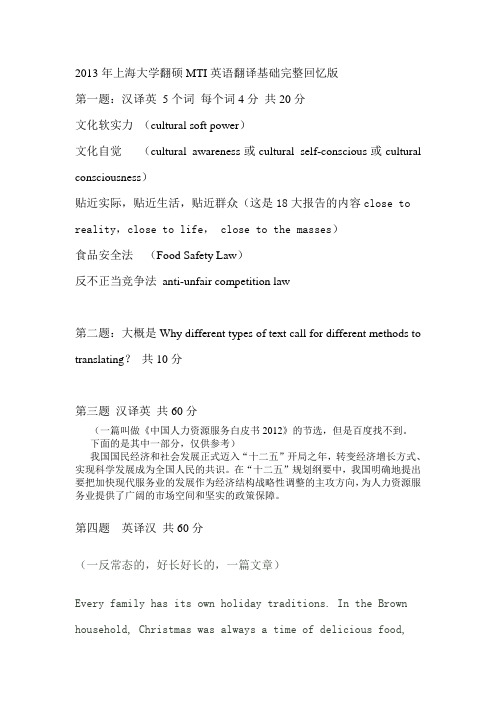
2013年上海大学翻硕MTI英语翻译基础完整回忆版第一题:汉译英5个词每个词4分共20分文化软实力(cultural soft power)文化自觉(cultural awareness或cultural self-conscious或cultural consciousness)贴近实际,贴近生活,贴近群众(这是18大报告的内容close to reality,close to life, close to the masses)食品安全法(Food Safety Law)反不正当竞争法anti-unfair competition law第二题:大概是Why different types of text call for different methods to translating?共10分第三题汉译英共60分(一篇叫做《中国人力资源服务白皮书2012》的节选,但是百度找不到。
下面的是其中一部分,仅供参考)我国国民经济和社会发展正式迈入“十二五”开局之年,转变经济增长方式、实现科学发展成为全国人民的共识。
在“十二五”规划纲要中,我国明确地提出要把加快现代服务业的发展作为经济结构战略性调整的主攻方向,为人力资源服务业提供了广阔的市场空间和坚实的政策保障。
第四题英译汉共60分(一反常态的,好长好长的,一篇文章)Every family has its own holiday traditions. In the Brown household, Christmas was always a time of delicious food,sing-alongs, colorful gifts, and mysterious codes.Yes, codes.When I was a kid, no Christmas morning was complete without the annual treasure hunt. When the last present under the Christmas tree had been opened, my siblings and I knew that there still remained one "big" present hidden somewhere in the house for us to find. Our only hope of locating it was a cryptic clue that traditionally resided in a lone envelope perched high on the tree, out of our reach.One year the envelope contained a particularly mind-boggling treasure hunt that my brother, sister and I still recall as The "TOCEP" Christmas Mystery. (In fact, this treasure hunt directly inspired the scene on page 111 of The Da Vinci Code.) That was the year we had a foreign exchange student living with us. Bea was South African and understandably was somewhat overwhelmed by the frenzied anticipation that led up to an American Christmas. Nonetheless, she embraced the decorating, singing, and cooking with a zeal that made the holidays doubly special for us that year. So it was with great happiness, on Christmas morning, after all the presents were opened, that my parents handed Bea the mysterious envelope and explained to her the Brown tradition of a Christmas Quest.Looking amazed that such a tradition could exist, Bea excitedly opened the envelope. The poem inside announced that this year's quest involved locating five letters of the alphabet, which had been hidden around the house. According to the poem’s final stanza, the first letter we needed to find was "T."You seek a letter in a nook(It's very hard to see).But of the places you might look,There’s just one spot for "T."Only one spot for T?My little brother Greg was the first to figure it out. He leapt up and dashed into the kitchen. We all ran after him as he retrieved a stool, dragged it into the breakfast nook, climbed up onto the counter, and grabbed the canister in which my mother kept her tea bags. Sure enough, inside was a note card emblazoned with the letter "T."Brilliant!Along with the letter "T" we found another clue, which ingeniously guided us down to the basement where we found the letter "O" taped to an O-shaped Hoola Hoop.Again, fiendishly clever!From there more clues led us all over the house. In the kitchenwe found the letter "C" stuffed in a Vitamin C container. In the mud-room, the letter "E" was hidden inside my Exeter baseball cap (bearing that same letter).By then, we had located four letters (T-O-C-E), and still we felt no closer to understanding our mysterious prize. We hoped the fifth and final letter would make it all come clear. The final clue, however, was baffling.The final letter in your quest,Is simple as can be.It's hidden in a special roomQuite natural for a "P."A special room quite natural for a P?I looked in the pantry around the canned peas. Nothing.My little brother checked his bedroom for his Phillies cap. Nothing.A natural place for "P"?It was Beatrice, our exchange student (having learned a good amount of American slang), who suddenly gasped, jumped to her feet, and dashed up the stairs. For a moment, my siblings and I thought she was ill... but then we heard her shriek with joy. We raced upstairs to find Bea in the bathroom, laughing hysterically and pointing into the toilet. We peered inside,and there, to our enormous delight, we found the letter "P" taped inside the toilet bowl."P" in the toilet!The joke left all four of us kids rolling on the floor in hysterics. Surely my parents had to be the two funniest people alive. Finally, when we all could breathe again, we hurried back to the living room to decipher the meaning of these five mysterious lettersT-O-C-E-P?We spread the letters out on the living room floor and stared at them.T...O...C...E...P?They meant nothing to us.It was my younger sister Valerie who saw it first. She drew a startled breath and spun to my parents in disbelief. "No!" she exclaimed. "Really?"My parents were beaming. "Really. We leave tomorrow morning." The rest of us kids watched in rapt animation as little Valerie victoriously rearranged the five letters TOCEP.... to spell one magical word: EPCOT. Instantly, all four kids were dancing around the room, whooping for joy, chanting "Epcot! Epcot!" Even our exchange student Bea had heard of Walt Disney World'sEpcot Center, and she joined in the dance. It was a dream come true. The very next morning, we all boarded a plane for Epcot. It was the best Christmas ever.附上答案一枚每个家庭都有自己的过节传统,我们布朗家也是如此。
翻译资格考试:2013年9月上海中级口译听力真题完整版
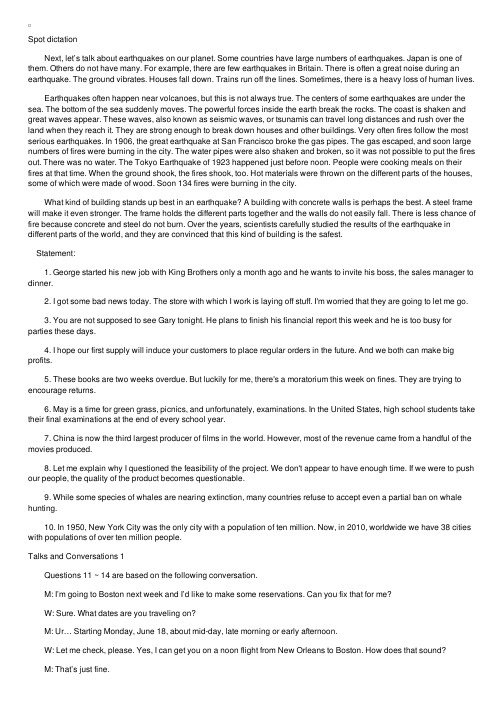
Spot dictation Next, let’s talk about earthquakes on our planet. Some countries have large numbers of earthquakes. Japan is one of them. Others do not have many. For example, there are few earthquakes in Britain. There is often a great noise during an earthquake. The ground vibrates. Houses fall down. Trains run off the lines. Sometimes, there is a heavy loss of human lives. Earthquakes often happen near volcanoes, but this is not always true. The centers of some earthquakes are under the sea. The bottom of the sea suddenly moves. The powerful forces inside the earth break the rocks. The coast is shaken and great waves appear. These waves, also known as seismic waves, or tsunamis can travel long distances and rush over the land when they reach it. They are strong enough to break down houses and other buildings. Very often fires follow the most serious earthquakes. In 1906, the great earthquake at San Francisco broke the gas pipes. The gas escaped, and soon large numbers of fires were burning in the city. The water pipes were also shaken and broken, so it was not possible to put the fires out. There was no water. The Tokyo Earthquake of 1923 happened just before noon. People were cooking meals on their fires at that time. When the ground shook, the fires shook, too. Hot materials were thrown on the different parts of the houses, some of which were made of wood. Soon 134 fires were burning in the city. What kind of building stands up best in an earthquake? A building with concrete walls is perhaps the best. A steel frame will make it even stronger. The frame holds the different parts together and the walls do not easily fall. There is less chance of fire because concrete and steel do not burn. Over the years, scientists carefully studied the results of the earthquake in different parts of the world, and they are convinced that this kind of building is the safest. Statement: 1. George started his new job with King Brothers only a month ago and he wants to invite his boss, the sales manager to dinner. 2. I got some bad news today. The store with which I work is laying off stuff. I'm worried that they are going to let me go. 3. You are not supposed to see Gary tonight. He plans to finish his financial report this week and he is too busy for parties these days. 4. I hope our first supply will induce your customers to place regular orders in the future. And we both can make big profits. 5. These books are two weeks overdue. But luckily for me, there's a moratorium this week on fines. They are trying to encourage returns. 6. May is a time for green grass, picnics, and unfortunately, examinations. In the United States, high school students take their final examinations at the end of every school year. 7. China is now the third largest producer of films in the world. However, most of the revenue came from a handful of the movies produced. 8. Let me explain why I questioned the feasibility of the project. We don't appear to have enough time. If we were to push our people, the quality of the product becomes questionable. 9. While some species of whales are nearing extinction, many countries refuse to accept even a partial ban on whale hunting. 10. In 1950, New York City was the only city with a population of ten million. Now, in 2010, worldwide we have 38 cities with populations of over ten million people.Talks and Conversations 1 Questions 11 ~ 14 are based on the following conversation. M: I’m going to Boston next week and I’d like to make some reservations. Can you fix that for me? W: Sure. What dates are you traveling on? M: Ur… Starting Monday, June 18, about mid-day, late morning or early afternoon. W: Let me check, please. Yes, I can get you on a noon flight from New Orleans to Boston. How does that sound? M: That’s just fine. W: OK. Now where are you planning to stay? M: Top Hotel, Boston. Would you make reservations for Monday, June 18 and Tuesday, June 19? Two nights, single, with bath, please. By the way, I prefer it in the non-smoking area. W: June 18 and 19. Single with bath. Non-smoking area. Top Hotel, Boston. Yes, they have the room available. M: Fine. 11 What is the man doing? 12 When is the man’s flight? 13 How long is the man going to stay in Boston? 14 Which of the following is not a requirement by the man for his accommodation? 【评析】 本对话是⼀段关于订机票和酒店的⽇常对话,难度不⼤,主要考察细节获取。
2013上外高翻会口专业翻译原文
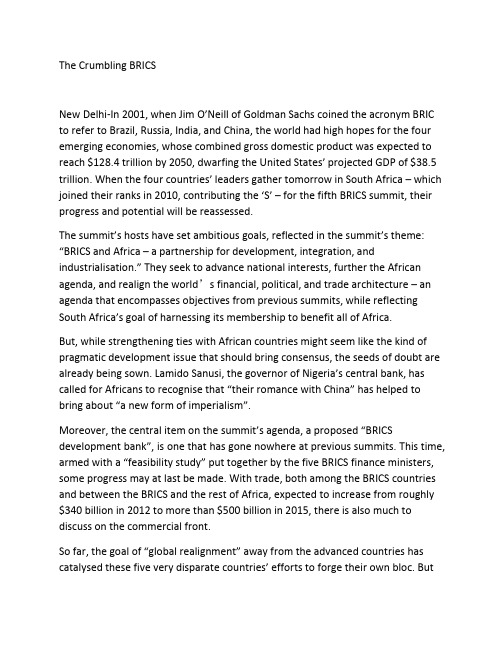
The Crumbling BRICSNew Delhi-In 2001, when Jim O’Neill of Goldman Sachs coined the acronym BRIC to refer to Brazil, Russia, India, and China, the world had high hopes for the four emerging economies, whose combined gross domestic product was expected to reach $128.4 trillion by 2050, dwarfing the United States’ projected GDP of $38.5 trillion. When the four countries’ leaders gather tomorrow in South Africa – which joined their ranks in 2010, contributing the ‘S’ – for the fifth BRICS summit, their progress and potential will be reassessed.The summit’s hosts have set ambitious goals, reflected in the summit’s theme: “BRICS and Africa – a partnership for development, integration, and industrialisation.” They seek to advance national interests, further the African agenda, and realign the world’s financial, political, and trade architecture – an agenda that encompasses objectives from previous summits, while reflecting South Africa’s goal of harnessing its membership to benefit all of Africa.But, while strengthening ties with African countries might seem like the kind of pragmatic development issue that should bring consensus, the seeds of doubt are already being sown. Lamido Sanusi, the governor of Nigeria’s central bank, has called for Africans to recognise that “their romance with China” has helped to bring abo ut “a new form of imperialism”.Moreover, the central item on the summit’s agenda, a proposed “BRICS development bank”, is one that has gone nowhere at previous summits. This time, armed with a “feasibility study” put together by the five BRICS finance ministers, some progress may at last be made. With trade, both among the BRICS countries and between the BRICS and the rest of Africa, expected to increase from roughly $340 billion in 2012 to more than $500 billion in 2015, there is also much to discuss on the commercial front.So far, the goal of “global realignment” away from the advanced countries has catalysed these five very disparate countries’ efforts to forge their own bloc. Butthe primacy given to “advancing national interests” has always precluded real concerted action, at least until now.This is why the idea of establishing a BRICS development bank has taken on such importance. And the recently conducted feasibility study might spur long-awaited progress. But toward what end?According to China’s official news agency, the development bank’s primary objective would be “to direct development in a manner that reflects the BRICS’ priorities and competencies”. Once the bank is established, a workin g group will be tasked with building the necessary technical and governance capacity.But this stock rhetoric fails to address the discrepancies between the BRICS’ interests, or to define the bank’s role in reconciling and advancing them.The fact that Chi na is already Africa’s top trading partner, for example, invites questions about the proposed bank’s potential contributions. And China’s answer –that the bank would foster the “development of more robust and inter-dependent ties between the BRIC S” – provides little substance. Is the bank supposed to serve as a counterweight to global multilateral development financiers such as the World Bank, or to reduce American and European dominance over the Bretton Woods institutions?Whatever the underlying objective, it must be identified, and its concomitant risks addressed, if the BRICS are to make genuine progress. For example, if the proposed bank is simply an additional funding institution aimed at supporting the BRICS’s development agenda, the participating countries’ leaders must establish how it will interact with national institutions, such as the Brazilian Development Bank, the China Development Bank, and the Export-Import Bank of India.But the problem of aligning the BRICS’ interests is a much deeper one. Consider India’s need for massive investments in infrastructure, made evident in its just-proposed 2013-14 budget. Some hopeful Indians see a BRICS bank as a way to channel China’s surplus funds – as well as its expertise and experience – to such investments (especially railways), as well as to strengthen Sino-Indian ties. But given the two countries’ many serious bilateral problems, will either governmentreally want to bind itself so closely to the other? Although Wen Jiabao, in his final address as prim e minister, highlighted the enduring obstacles to China’s economic development (many of which its fellow BRICS share), China’s new president, Xi Jinping, insists that his country will not sacrifice its “sovereignty, security, or development interes ts” for the sake of more trade.Meanwhile, Russia’s impaired democracy and resource-driven economy are a poor example for its fellow BRICS – and, in fact, could serve as a warning to the others about the risks of excessive reliance on the state. And Brazil, like India a genuine democracy, also seems sui generis. Despite the commodities boom of the last decade, its industrial output relative to GDP is no higher than it was when the effort to create a BRICS bloc began.The BRICS’ ambitions –and the world’s expectati ons for them – may yet be fulfilled. But shared potential does not translate into collaborative action. On the contrary, each of the BRICS will have to pursue its goals, and confront its challenges, individually.中国别急着成消费型社会中国30多年保持经济高速增长,但投资、消费、净出口“三驾马车”的“失衡”却成为众矢之的。
2013年3月春季高级口译真题
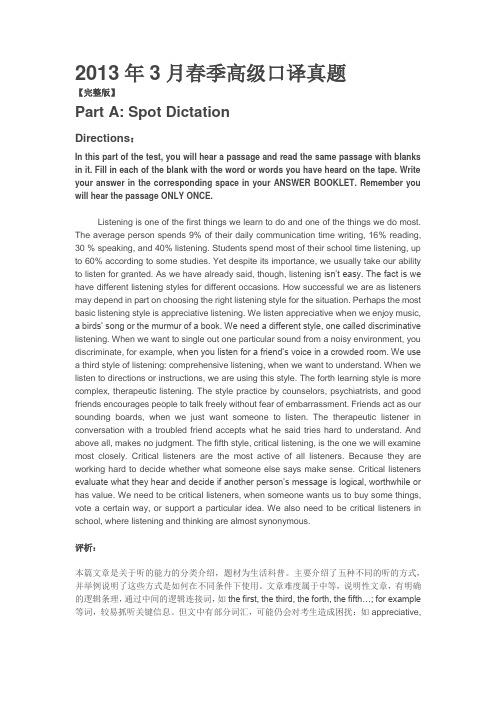
2013年3月春季高级口译真题【完整版】Part A: Spot DictationDirections:In this part of the test, you will hear a passage and read the same passage with blanks in it. Fill in each of the blank with the word or words you have heard on the tape. Write your answer in the corresponding space in your ANSWER BOOKLET. Remember you will hear the passage ONLY ONCE.Listening is one of the first things we learn to do and one of the things we do most. The average person spends 9% of their daily communication time writing, 16% reading, 30 % speaking, and 40% listening. Students spend most of their school time listening, up to 60% according to some studies. Yet despite its importance, we usually take our ability to listen for granted. As we have already said, though, listening isn‟t easy. The fact is we have different listening styles for different occasions. How successful we are as listeners may depend in part on choosing the right listening style for the situation. Perhaps the most basic listening style is appreciative listening. We listen appreciative when we enjoy music, a birds‟ song or the murmur of a book. We need a different style, one called discriminative listening. When we want to single out one particular sound from a noisy environment, you discriminate, for example, when you listen for a friend‟s voice in a crowded room. We use a third style of listening: comprehensive listening, when we want to understand. When we listen to directions or instructions, we are using this style. The forth learning style is more complex, therapeutic listening. The style practice by counselors, psychiatrists, and good friends encourages people to talk freely without fear of embarrassment. Friends act as our sounding boards, when we just want someone to listen. The therapeutic listener in conversation with a troubled friend accepts what he said tries hard to understand. And above all, makes no judgment. The fifth style, critical listening, is the one we will examine most closely. Critical listeners are the most active of all listeners. Because they are working hard to decide whether what someone else says make sense. Critical listeners evaluate what they hear and decide if another person‟s message is logical, worthwhile or has value. We need to be critical listeners, when someone wants us to buy some things, vote a certain way, or support a particular idea. We also need to be critical listeners in school, where listening and thinking are almost synonymous.评析:本篇文章是关于听的能力的分类介绍,题材为生活科普。
三口真题201311

三级口译-2013、11Part 1、英汉对话互译A: I’ve heard Chinese government is pushing a major poverty relief program across th e country、 Would you please outline this program and its targeted population group? 我听说中国政府正在全国范围内实施一项重大扶贫计划。
能够简要介绍一下该计划及其针对的群体?B: 好的,我国政府有关部门根据国家扶贫开发的总体战略,提出了扶贫的目标、措施与实施办法,扶贫的主要地区与对象就是贫困的农村地区与农民。
Well、According to the overall strategy of the country’s poverty relief program, the related department has proposed the objectives and implementation measures、The program is mainly targeted at poverty-stricken rural areas and farmers、A: How would you go about achieving your ambitious objectives?您们(中国政府)如何实现这一雄心勃勃的目标呢?B: 中国政府安排专项扶贫资金,用于优良品种的引进、试验、示范与推广。
Chinese government has earmarked special funding for introduction, testing, demonstration and promotion of improved seeds / improved seed strains、A: I think one of the major problems of reducing the poverty among the rural populati on is the education of people in the remote areas rather than mere funding、 That is, we should inform them of the technical knowhow and updating the official mode of pr oduction、我觉得,农村扶贫的一大关键就是,就是要教育偏远地区的人们,而不就是仅仅安排专项资金。
2013上海大学翻译硕士MTI考研真题(近完整版)
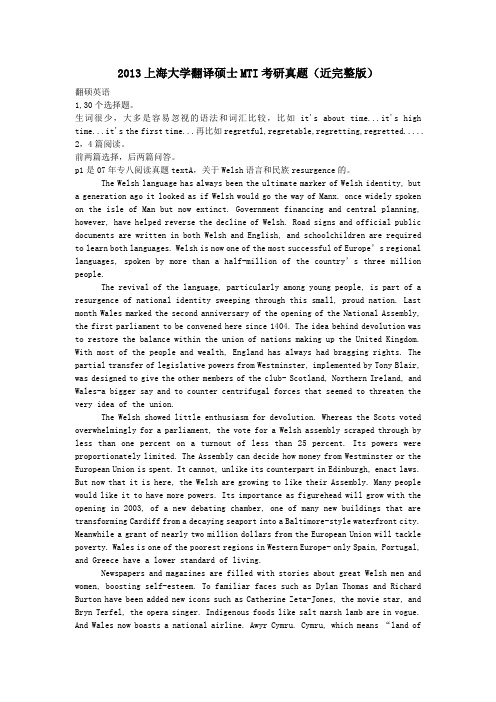
2013上海大学翻译硕士MTI考研真题(近完整版)翻硕英语1,30个选择题。
生词很少,大多是容易忽视的语法和词汇比较,比如it's about time...it's high time...it's the first time...再比如regretful,regretable,regretting,regretted..... 2,4篇阅读。
前两篇选择,后两篇问答。
p1是07年专八阅读真题textA,关于Welsh语言和民族resurgence的。
The Welsh language has always been the ultimate marker of Welsh identity, but a generation ago it looked as if Welsh would go the way of Manx. once widely spoken on the isle of Man but now extinct. Government financing and central planning, however, have helped reverse the decline of Welsh. Road signs and official public documents are written in both Welsh and English, and schoolchildren are required to learn both languages. Welsh is now one of the most successful of Europe’s regional languages, spoken by more than a half-million of the country’s three million people.The revival of the language, particularly among young people, is part of a resurgence of national identity sweeping through this small, proud nation. Last month Wales marked the second anniversary of the opening of the National Assembly, the first parliament to be convened here since 1404. The idea behind devolution was to restore the balance within the union of nations making up the United Kingdom. With most of the people and wealth, England has always had bragging rights. The partial transfer of legislative powers from Westminster, implemented by Tony Blair, was designed to give the other members of the club- Scotland, Northern Ireland, and Wales-a bigger say and to counter centrifugal forces that seemed to threaten the very idea of the union.The Welsh showed little enthusiasm for devolution. Whereas the Scots voted overwhelmingly for a parliament, the vote for a Welsh assembly scraped through by less than one percent on a turnout of less than 25 percent. Its powers were proportionately limited. The Assembly can decide how money from Westminster or the European Union is spent. It cannot, unlike its counterpart in Edinburgh, enact laws. But now that it is here, the Welsh are growing to like their Assembly. Many people would like it to have more powers. Its importance as figurehead will grow with the opening in 2003, of a new debating chamber, one of many new buildings that are transforming Cardiff from a decaying seaport into a Baltimore-style waterfront city. Meanwhile a grant of nearly two million dollars from the European Union will tackle poverty. Wales is one of the poorest regions in Western Europe- only Spain, Portugal, and Greece have a lower standard of living.Newspapers and magazines are filled with stories about great Welsh men and women, boosting self-esteem. To familiar faces such as Dylan Thomas and Richard Burton have been added new icons such as Catherine Zeta-Jones, the movie star, and Bryn Terfel, the opera singer. Indigenous foods like salt marsh lamb are in vogue. And Wales now boasts a national airline. Awyr Cymru. Cymru, which means “land ofcompatriots,” is the Welsh name for Wales. The red dragon, the nation’s symbol since the time of King Arthur, is everywhere- on T-shirts, rugby jerseys and even cell phone covers.“Until very recent times most Welsh people had this feeling of being second-class citizens,” said Dyfan Jones, an 18-year-old student. It was a warm summer night, and I was sitting on the grass with a group of young people in Llanelli, an industrial town in the south, outside the rock music venue of the National Eisteddfod, Wales’s annual cultural festival. The disused factory in front of us echoed to the sounds of new Welsh bands.“There was almost a genetic tendency for lack of confidence,” Dyfan continued. Equally comfortable in his Welshness as in his membership in the English-speaking, global youth culture and the new federal Europe, Dyfan, like the rest of his generation, is growing up with a sense of possibility unimaginable ten years ago. “We used to think. We can’t do anything, we’re only Welsh. Now I think that’s changing.”p2是讲网络个人信息隐私不安全的,比较好找,选项直接。
2013年3月上海中级口译考试翻译(英译汉)

2013年3月上海中级口译考试翻译(英译汉)(总分:100.00,做题时间:90分钟)一、英译汉(总题数:1,分数:100.00)1.If you’ve ever been on a jury, you might have noticed that a funny thing happens the minute you get behind closed doors. Everybody starts talking about themselves. They say what they would have done if they had been the plaintiff or the defendant. Being on a jury reminds me why I can’t tolerate talk radio. We Americans seem to have lost the ability to talk about anything but our own experiences. We can’t seem to generalize without stereotyping or to consider evidence that goes against our own experience. I heard a doctor on a radio show talking about a study that found that exercise reduces the incidence of Alzheimer’s. And caller after caller couldn’t wait to make essentially the opposite point: “Well, my grandmother never exercised and she lived to 95.” We are in an age summed up by the saying: “I experience, therefore I’m right.” Historically, the hallmarks of an uneducated person were the lack of ability to think critically, to use deductive reasoning to distinguish the personal from the universal. Now that seems an apt description of many Americans.(分数:100.00)__________________________________________________________________________________________ 正确答案:( 如果你曾经当过陪审员,你可能会注意到一件有趣的事情:一旦关上了门,所有人就开始谈论他们自己。
2013年3月上海高级口译翻译(汉译英)

2013年3月上海高级口译翻译(汉译英)(总分:100.00,做题时间:90分钟)一、汉译英(总题数:1,分数:100.00)1.之所以把论坛取名为“蓝厅论坛”,是因为蓝色让人联想到大海和天空,既包容万象又蕴含热情与活力,契合了和谐共存、开放共赢的理念。
它寓意着我们将以海纳百川的包容精神,汲取各界智慧,深化对话交流;以纵论天下的开阔视野,把握时代脉搏,共谋发展大计。
对于21世纪的亚太,人们曾经有不同的看法。
有人认为亚太人文荟萃,潜力巨大,前景光明。
也有人认为亚太问题丛生,麻烦不断,不容乐观。
如今,当21世纪第一个10年即将结束的时候,回顾亚太发展进程,我们不难发现,尽管亚太地区由于历史和现实的原因,还存在这样那样的问题和挑战,但谋和平、维稳定、求合作、促发展是人心所向、大势所趋,亚太正在成为一个充满活力、生机与希望的地区(分数:100.00)__________________________________________________________________________________________ 正确答案:(Lanting, as you may know, means the blue hall in Chinese. This Forum is called Lanting Forum because people naturally associate the blue color with the sea and the sky. It symbolizes inclusiveness, passion and vitality, and it accords to the philosophy of harmonious coexistence, openness and win-win progress. It shows that we will adopt an inclusive approach, pool together the wisdom of various sectors and deepen dialogue and exchanges. It also means that we will take a global perspective, keep pace with the times and work together for development. There were different views about the Asia Pacific in the 21st century. Some believed that rich human resources and cultural diversity held out great potential and bright prospects for the Asia-Pacific region, while others thought this region was beset with problems and troubles and could hardly offer any reason for optimism. Now the first decade of the 21st century is coming to an end. When we look back on the journey that the region has travelled, I believe we can come to the following conclusions: Despite the various problems and challenges due to reasons both of the past and present, peace, stability, cooperation and development represent the shared aspiration of the people and the trend of the times. What has happened shows that the Asia Pacific is transforming into a dynamic, vibrant and promising region. )解析:文本节选自前外交部长杨洁篪于2010年12月1日在首届“蓝厅论坛”上的讲话,是整篇演讲的第一段。
2013年9月上海市高级口译第二阶段口试真题试卷(精选)(题后含答案及解析)

2013年9月上海市高级口译第二阶段口试真题试卷(精选)(题后含答案及解析)题型有: 2. 口译题口译题Part A Directions: In this part of the test, you will hear 2 passages in English. After you have heard each paragraph, interpret it into Chinese. Start interpreting at the signal.., and stop it at the signal...You may take notes while you are listening. Remember you will hear the passages ONLY ONCE. Now let us begin Part A with the first passage.听力原文:Higher education is more than a vocational or technical training. The essential purpose of it has never been about “usefulness”in a narrow sense of acquiring a specific, practical tool so as to make oneself marketable. In the words of my late college professor of philosophy, the purpose of higher education is for students to become broadly acquainted with cultural traditions and deeply appreciate them, so that it may help us become responsible citizens and good people in general. It is also about love—learning what one loves for the love of learning. Hence, it is “gloriously useless. “ As for me, there was no way of knowing which major or degree was going to be “useful. “And since then, everything around me is constantly changing. I have long forgotten the details of what I absorbed in classrooms and libraries. I did, however, learn how to think for myself, and that is invaluable in the workplace and outside of it.1.Passage 1正确答案:高等教育不仅仅是职业或技术培训,其基本目的从来就不是一味地传授狭义上“有用的东西”,也就是让学生获得专门的实用技能,使他们能进人职场。
- 1、下载文档前请自行甄别文档内容的完整性,平台不提供额外的编辑、内容补充、找答案等附加服务。
- 2、"仅部分预览"的文档,不可在线预览部分如存在完整性等问题,可反馈申请退款(可完整预览的文档不适用该条件!)。
- 3、如文档侵犯您的权益,请联系客服反馈,我们会尽快为您处理(人工客服工作时间:9:00-18:30)。
201320135%1.Clinton's Global Initiative2.Elysee Palace3.Palace of Westminster4.Department of Interior5.lead from the behind6.bank run7.Libor8.Sequester9.Korean Armistice Agreement10.Muslim Brotherhood11.Lean In12.Troika13.Air Force One14.PM2.515.Anonymous (an organisation)16. China Railway Corporation5%1.2.3.4.5. .6. 5007.8.9.10.11. 5+112.13.14.Global Markets' Time Factor21 March 2013BARCELONA – In recent months, the dichotomy between booming financial markets, on the one hand, and sluggish economies and dysfunctional politics, on the other, has loomed large. Yet insufficient attention is being devoted to a critical factor – time, and who controls it – that could well mean the difference between an orderly global resolution of today’s growing inconsistencies and a return to a more troubled phase.Markets have been understandably buoyant in the first quarter of 2013. Most economic data confirm that, after the trauma caused by the global financial crisis, the United States’ economy is healing, and doing so in an accelerated fashion.The sequence is now well established. It started with large multinational companies, which are on as solid a financial footing as I can remember. Smaller firms are gradually recuperating; banks have rebuilt their capital cushions and reduced their dubious assets; the housing sector has stabilized; and a growing number of households are reestablishing healthier balance sheets, especially as employment gradually picks up.This private-sector recovery is helping government finances. The US budget deficit has been on a downward trend for now, helped by both higher revenues and lower pressure on spending (for example, payments to the unemployed have fallen as joblessness has declined).The healing process is also evident in Europe, though, unfortunately, it is effectively limited only to sovereign-bond markets. The real economy remains under enormous pressure in several countries, as economies contract and unemployment remains alarmingly high.After flirting with disaster last July, interest-rate spreads for eurozone bonds have generally been subdued, and financial segmentation has been slowly reversed (that is, at least before European officials embarked on the controversial path of trying to impose losses on guaranteed bank deposits in Cyprus). Moreover, as Ireland’s highlysuccessful €5 billion ten-year bond issue in mid-March demonstrated, some countries are in the process of restoring normal access to capital markets.The impact on markets of these trends has been turbocharged by central banks, which are risk markets’ best friends. This is not because they wish to play that role; rather, it is because higher asset prices are essential if central bankers stand any chance of delivering the desired economic outcomes of higher growth and stronger job creation.This is most evident in the US, where markets love the Federal Reserve’s trifecta of near-zero policy interest rates (negative in real terms), aggressive forward policy guidance, and asset purchases – all of which push investors to take more risk. Markets also welcome the fact that the Fed’s hyperactive experimentation is forcing other central banks around the world to pursue more expansionary policies.Indeed, from the Bank of Japan’s dramatic policy U-turn to the Bank of Mexico’s surprise interest-rate cuts, the Fed’s approach is affecting central banks in a growing number of countries. Pushed further away from best-case scenarios, they are unable to ignore the global liquidity impact of the Fed’s policies, yet they lack the right policy tools to address it.The mix of endogenous healing and strong central-bank tailwinds, including from a “whatever it takes” European Central Bank, has also helped markets shrug off troubling political uncertainties. Be it the US Congress’s paralyzing polarization or Italy’s protest vote against the established political order, politicians are being given time to overcome their dysfunction, thereby minimizing any immediate disruptive impact.Understandably, investors have interpreted all of this as a green light to take more risk. And with the hype this month over eight successive records for the Dow Jones index (and many other records around the world), excitement induces more investors to enter riskier asset markets.The excitement is not anxiety-free, however, and rightly so. Investors worry about the longer-term consequences of political dysfunction, another year of Europeaneconomic contraction, disastrously high unemployment, unprecedented – and thus untested – central bank policies, and increasing global tensions. And the recent bungling of the Cyprus rescue does not help. No wonder some have called the recent market rally “one of the most unloved” in history.This mix of excitement and anxiety is, in fact, a sign of the looming crossroads that faces investors. One road, involving a relatively orderly handoff from policy-assisted recovery to self-sustaining growth, offers the possibility of even greater financial rewards, as rapidly improving economic and political conditions validate current artificial pricing and drive it higher.The other road is a lot less attractive. With insufficient endogenous healing and no economic escape velocity, the effectiveness of central banks’ policies wanes and political dysfunction increases, leading to financial losses, volatility spikes, and huge risk-management challenges.Given current policy and political uncertainties – and the multiple equilibria that they entail – it is difficult to predict with a high degree of confidence which road eventually will be taken and when. Those who claim otherwise may well fail to appreciate fully the exceptional nature of the current situation.In these circumstances, timing may not be everything, but it may prove to be a key determinant of the probabilities. If the journey to the crossroads is accelerated by a large geopolitical shock (originating in, say, the Middle East or North Korea) and/or a serious political breakdown in Europe (for example, a meltdown in Cyprus or prolonged political paralysis in Italy), the probability of taking the adverse path rises to an uncomfortably high level. If, however, central banks can contain domestic and global inconsistencies long enough, the combination of endogenous healing and eventual political progress would significantly improve the probability distribution.Have no doubt: today’s markets rely heavily on the old adage that “time heals all wounds.” The timekeepers are central banks. But their control of the clock is less than perfect; and it will become increasingly ineffective if economic improvement faces additional political headwinds in the months ahead.20%Think carefully about the issue presented in the following excerptand the assignment below.Nowadays nothing is private: our culture has become tooconfessional and self-expressive. People think that to hide one’sthoughts or feelings is to pretend not to have those thoughts orfeelings. They assume that honesty requires one to express everyinclination and impulse.Adapted from J. David Velleman, “The Genesis of Shame”Assignment: Should people make more of an effort to keep some things private?Plan and write an essay in which you develop your point of view on this issue.Support your position with reasoning and examples taken from your reading,studies, experience, or observations.2013201325%)The Crumbling BRICSNew Delhi-In 2001, when Jim O’Neill of Goldman Sachs coined the acronym BRIC to refer to Brazil, Russia, India, and China, the world had high hopes for the fouremerging economies, whose combined gross domestic product was expected to reach$128.4 trillion by 2050, dwarfing the United States’ projected GDP of $38.5 trillion. When the four countries’ leaders gather tomorrow in South Africa – which joined their ranks in 2010, contributing the ‘ S ’ – for the fifth BRICS summit, their progress and potential will be reassessed.The summit ’ s hosts have set ambitious goals, reflected in the summit ’ s theme:“ BRICS and Africa – a partnership for development, integration, andindustrialisation.” They seek to advance national interests, further the African agenda,and realign the world’s financial, political, and trade architecture – an agenda that encompasses objectives from previous summits, while reflecting South Africa’s goal of harnessing its membership to benefit all of Africa.But, while strengthening ties with African countries might seem like the kind of pragmatic development issue that should bring consensus, the seeds of doubt are already being sown. Lamido Sanusi, the governor of Nigeria ’ s central bank, has called for Africans to recognise that “their romance with China” has helped to bring about “a new form of imperialism”.Moreover, the central item on the summit ’ s agenda, a proposed “ BRICS development bank”, is one that has gone nowhere at previous summits. This time, armed with a “feasibility study” put together by the five BRICS finance ministers,some progress may at last be made. With trade, both among the BRICS countries and between the BRICS and the rest of Africa, expected to increase from roughly $340 billion in 2012 to more than $500 billion in 2015, there is also much to discuss on the commercial front.So far, the goal of “global realignment” away from the advanced countries has catalysed these five very disparate countries’ efforts to forge their own bloc. But the primacy given to“advancing national interests” has always precluded real concerted action, at least until now.This is why the idea of establishing a BRICS development bank has taken on such importance. And the recently conducted feasibility study might spur long-awaited progress. But toward what end?According to China ’ s official news agency, the development bank ’ s primary objective would be “to direct development in a manner that reflects the BRICS’priorities and competencies”. Once the bank is established, a working group will be tasked with building the necessary technical and governance capacity.But this stock rhetoric fails to address the discrepancies between the BRICS ’interests, or to define the bank’s role in reconciling and advancing them.The fact that China is already Africa ’ s top trading partner, for example, invites questions about the proposed bank’s potential contributions. And China’s answer –that the bank would foster the “development of more robust and inter-dependent tiesbetween the BRICS” – provides little substance. Is the bank supposed to serve as acounterweight to global multilateral development financiers such as the World Bank,or to reduce American and European dominance over the Bretton Woods institutions?Whatever the underlying objective, it must be identified, and its concomitant risks addressed, if the BRICS are to make genuine progress. For example, if the proposed bank is simply an additional funding institution aimed at supporting the BRICS ’s development agenda, the participating countries’ leaders must establish how it will interact with national institutions, such as the Brazilian Development Bank, the China Development Bank, and the Export-Import Bank of India.But the problem of aligning the BRICS’ interests is a much deeper one. Consider India ’ s need for massive investments in infrastructure, made evident in itsjust-proposed 2013-14 budget. Some hopeful Indians see a BRICS bank as a way to channel China’s surplus funds – as well as its expertise and experience – to such investments (especially railways), as well as to strengthen Sino-Indian ties. But given the two countries ’ many serious bilateral problems, will either government really want to bind itself so closely to the other? Although Wen Jiabao, in his final address as prime minister, highlighted the enduring obstacles to China ’ s economic development (many of which its fellow BRICS share), China’s new president, Xi Jinping, insists that his country will not sacrifice its “ sovereignty, security, ordevelopment interests” for the sake of more trade.Meanwhile, Russia’s impaired democracy and resource-driven economy are a poor example for its fellow BRICS – and, in fact, could serve as a warning to the others about the risks of excessive reliance on the state. And Brazil, like India a genuine democracy, also seems sui generis. Despite the commodities boom of the last decade,its industrial output relative to GDP is no higher than it was when the effort to create aBRICS bloc began.The BRICS’ ambitions – and the world’s expectations for them – may yet be fulfilled. But shared potential does not translate into collaborative action. On the contrary, each of the BRICS will have to pursue its goals, and confront its challenges, individually.25%30 “ ” “” “ ”10 38.9%1970-1980 10.5% 2001-2010 57.7%30 1.44-3 1.4-2.6 ;20“ ”“ ”。
